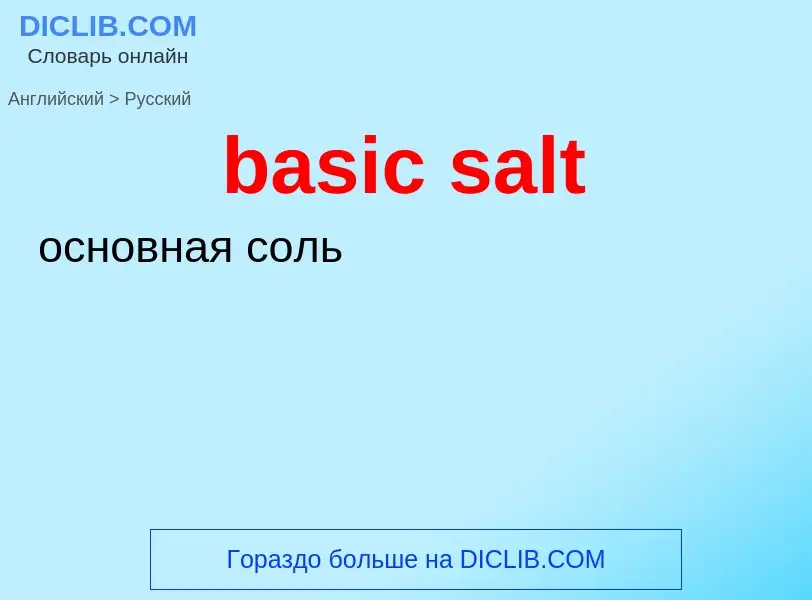Vertaling en analyse van woorden door kunstmatige intelligentie ChatGPT
Op deze pagina kunt u een gedetailleerde analyse krijgen van een woord of zin, geproduceerd met behulp van de beste kunstmatige intelligentietechnologie tot nu toe:
- hoe het woord wordt gebruikt
- gebruiksfrequentie
- het wordt vaker gebruikt in mondelinge of schriftelijke toespraken
- opties voor woordvertaling
- Gebruiksvoorbeelden (meerdere zinnen met vertaling)
- etymologie
basic salt - vertaling naar russisch
Definitie
Wikipedia
Alkali salts or basic salts are salts that are the product of incomplete neutralization of a strong base and a weak acid.
Rather than being neutral (as some other salts), alkali salts are bases as their name suggests. What makes these compounds basic is that the conjugate base from the weak acid hydrolyzes to form a basic solution. In sodium carbonate, for example, the carbonate from the carbonic acid hydrolyzes to form a basic solution. The chloride from the hydrochloric acid in sodium chloride does not hydrolyze, though, so sodium chloride is not basic.
The difference between a basic salt and an alkali is that an alkali is the soluble hydroxide compound of an alkali metal or an alkaline earth metal. A basic salt is any salt that hydrolyzes to form a basic solution.
Another definition of a basic salt would be a salt that contains amounts of both hydroxide and other anions. White lead is an example. It is basic lead carbonate, or lead carbonate hydroxide.
These materials are known for their high levels of dissolution in polar solvents.
These salts are insoluble and are obtained through precipitation reactions.


![Golmud salt evaporation pans at [[Golmud]], August 1993 Golmud salt evaporation pans at [[Golmud]], August 1993](https://commons.wikimedia.org/wiki/Special:FilePath/1993 Golmud salt pans.jpg?width=200)

![Bamyan]], [[Afghanistan]] Bamyan]], [[Afghanistan]]](https://commons.wikimedia.org/wiki/Special:FilePath/CH-NB - Afghanistan, Bamiyan, Bamyan (Bamian)- Menschen - Annemarie Schwarzenbach - SLA-Schwarzenbach-A-5-20-159.jpg?width=200)
![Comparison of table salt with [[kitchen salt]]. Shows a typical salt shaker and salt bowl with salt spread before each on a black background. Comparison of table salt with [[kitchen salt]]. Shows a typical salt shaker and salt bowl with salt spread before each on a black background.](https://commons.wikimedia.org/wiki/Special:FilePath/Comparison of Table Salt with Kitchen Salt.png?width=200)
![[[Halite]] (rock salt) from the [[Wieliczka salt mine]], Małopolskie, Poland [[Halite]] (rock salt) from the [[Wieliczka salt mine]], Małopolskie, Poland](https://commons.wikimedia.org/wiki/Special:FilePath/Halit (NaCl) - Kopalnia soli Wieliczka, Polska.jpg?width=200)
![[[Himalayan salt]] is [[halite]] with a distinct pink color. [[Himalayan salt]] is [[halite]] with a distinct pink color.](https://commons.wikimedia.org/wiki/Special:FilePath/Himalayan salt of Saúde flea market, São Paulo, Brazil.jpg?width=200)
![evaporation pond]] in [[Walvis Bay]], [[Namibia]]; [[halophile]] organisms give it a red colour. evaporation pond]] in [[Walvis Bay]], [[Namibia]]; [[halophile]] organisms give it a red colour.](https://commons.wikimedia.org/wiki/Special:FilePath/Loading sea salt at evaporation pond, Walvis Bay (2014).jpg?width=200)
![[[Bread and salt]] at a Russian wedding ceremony [[Bread and salt]] at a Russian wedding ceremony](https://commons.wikimedia.org/wiki/Special:FilePath/Russian bread and salt.jpg?width=200)
![pre-Inca times]] pre-Inca times]]](https://commons.wikimedia.org/wiki/Special:FilePath/Salinas de Maras, Peru-20Sept2013.jpg?width=200)
![Salt production in [[Halle, Saxony-Anhalt]] (1670) Salt production in [[Halle, Saxony-Anhalt]] (1670)](https://commons.wikimedia.org/wiki/Special:FilePath/Salzproduktion-Halle.jpg?width=200)
![Irregular crystals of [[sea salt]] Irregular crystals of [[sea salt]]](https://commons.wikimedia.org/wiki/Special:FilePath/Sea Salt.jpg?width=200)
![Sea salt [[evaporation pond]] at [[Walvis Bay]]. [[Halophile]] organisms impart a red colour. Sea salt [[evaporation pond]] at [[Walvis Bay]]. [[Halophile]] organisms impart a red colour.](https://commons.wikimedia.org/wiki/Special:FilePath/Sea salt, evaporation pond Walvis Bay (2014).jpg?width=200)
![SEM]] image of a grain of table salt SEM]] image of a grain of table salt](https://commons.wikimedia.org/wiki/Special:FilePath/Single grain of table salt (electron micrograph).jpg?width=200)
